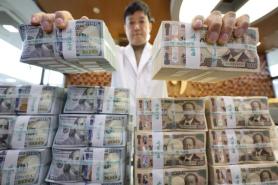![A staff member at Hana Bank's counterfeit response center in Seoul holds US dollars. [Photo=Yonhap]](https://image.ajunews.com/content/image/2025/11/19/20251119135355308931.jpg)
SEOUL, November 19 (AJP) - South Korea’s external debt climbed to more than $738 billion in the third quarter, though government officials said the country’s overall financial position strengthened as short-term liabilities declined and long-term debt expanded.
The Ministry of Economy and Finance said Wednesday that external debt reached $738.1 billion at the end of the July–September period, an increase of $2.5 billion from the previous quarter. The rise was largely driven by net purchases of Korean bonds by foreign investors, who injected 3.2 trillion won into listed bonds during the quarter, including 3 trillion won in July alone.
Short-term debt — often viewed as more vulnerable to market volatility — fell by $5.4 billion to $161.6 billion. Long-term debt rose by $7.9 billion to $576.5 billion, offsetting the decline and contributing to the overall uptick.
Borrowing by non-bank entities, including public institutions and private companies, increased by $9 billion, while the government, central bank and commercial banks reduced their external liabilities by $3.2 billion, $1.2 billion and $2.1 billion, respectively.
South Korea’s external assets also expanded, rising by $27.1 billion to $1.1199 trillion on the back of strong overseas bond investments and higher foreign currency deposits. As a result, net external assets — the difference between what the country owns abroad and what it owes — increased to $381.8 billion.
Key indicators of financial stability improved as well. The share of short-term debt in total external debt declined to 21.9 percent, below the three-year average of 23.8 percent. The ratio of short-term debt to foreign reserves fell to 38.3 percent from 40.7 percent, suggesting greater resilience against potential foreign exchange shocks.
Meanwhile, the foreign currency liquidity coverage ratio of domestic banks stood at 160.4 percent at the end of the quarter, far exceeding the regulatory minimum of 80 percent.
“Despite uncertainties in global trade and shifts in monetary policy, we will continue to safeguard the stability of our economy,” an official at the Ministry of Economy and Finance said.
* This article, published by Economic Daily, was translated by AI and edited by AJP.
Copyright ⓒ Aju Press All rights reserved.



